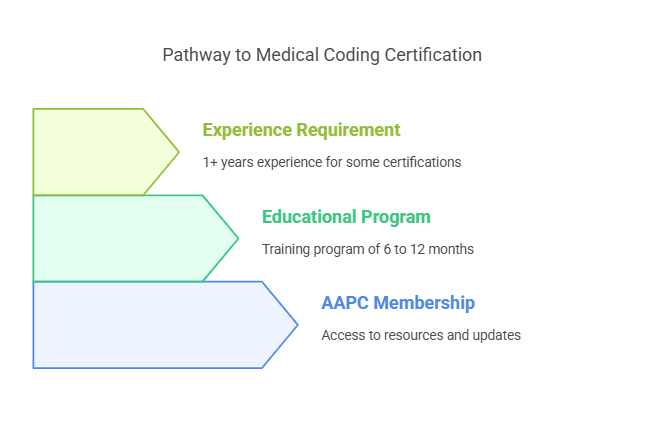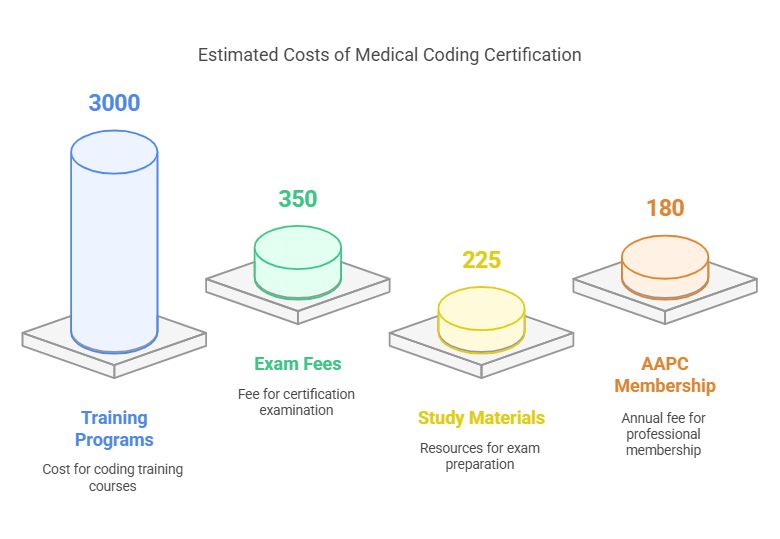How Do I Get Certified as a Medical Coder: A Step-by-Step Guide
A perfect combination of work-from-home projects and telemedicine has propelled medical coding into one of the most coveted professions of 2025. The same applies to digitalized healthcare records and AI-powered coding. If you have been asking yourself, “How do I get certified as a medical coder?”, this guide will help you comprehend medical coding, choose the right certification, and take all necessary steps to successfully pass the certification exam.
Best Takeaways to Help You Become a Certified Medical Coder
✅ In Demand in 2025: The general outlook for medical coders is favorable as the healthcare sector continues employing skilled professionals.
✅ Choosing the Right Path: Different certifications and training programs focus on various areas of development, helping you achieve different career objectives.
✅ Technology is Changing the Industry: AI-powered coding and automated billing are transforming medical coding.
✅ Certification is a Must: While non-certified professionals can code, certification ensures accuracy, compliance, and effective billing.
✅ Continuous Learning Required: Medical coders must relearn everything with every update in health policies and coding regulations.

Understanding Medical Coding and Billing for 2025
Medical coding certification is an essential component of the healthcare system. It ensures that every medical service provided is captured accurately for billing and insurance purposes. AI-assisted medical coding tools are helping coders reduce errors and streamline the claims process. However, as of 2025, human coders are still necessary to analyze complex cases and ensure adherence to new policies and regulations.
Importance of Medical Coding
Provides a universal reference by converting medical diagnoses and procedures into standardized codes like CPT, ICD-10, and HCPCS.
Ensures payment accuracy and guarantees timely reimbursement for healthcare providers.
Facilitates automation and data analysis for hospitals, insurance providers, and researchers.
💡 Did You Know?
As of 2025, many healthcare organizations are adopting AI-assisted coding platforms, but certified coders are still needed to audit AI-generated codes and ensure compliance. Learn more from the Centers for Medicare & Medicaid Services (CMS).

Top Medical Coding Certifications in 2025
Selecting the right certification is the most crucial step in becoming a medical coder. Here are the most recognized certifications in 2025:
1. Certified Professional Coder (CPC) – AAPC
Ideal for outpatient coding and physician practices.
CPC is the most recognized certification in the industry.
Requires passing a 100-question online exam within 4 hours.
2. Certified Coding Specialist (CCS) – AHIMA
Best suited for hospital-based coding and inpatient settings.
Requires knowledge of ICD-10-CM and PCS coding.
Preferred by larger medical institutions.
3. Certified Inpatient Coder (CIC) – AAPC
Focuses on hospital inpatient coding.
Emphasizes ICD-10-PCS coding for complex hospital cases.
4. Certified Outpatient Coder (COC) – AAPC
Best for ambulatory surgical centers and outpatient departments.
Covers billing and compliance aspects for Medicare.
5. Certified Medical Auditor (CPMA) – AAPC
Ideal for those interested in coding and compliance auditing or fraud examination.
Highly sought after by insurance companies and legal organizations.
💡 Pro Tip: Some employers require dual certifications (e.g., CPC + CPMA) to increase job prospects and salary potential.

Eligibility Requirements for Medical Coding Certification
While a college degree is not mandatory, it is preferred by many employers. To qualify for certification, you must meet the following requirements:
Educational Requirements
Complete a medical coding training program (online or in-person).
The program duration typically ranges from 6 to 12 months.
Experience Requirements
Some certifications, like CMC, require 1+ years of experience.
Entry-level coders can start with CPC-A (Apprentice status) until they gain work experience.
AAPC Membership
Required for CPC, COC, and CPMA certifications.
Provides access to study materials, career support, and industry updates.

Preparing for the Medical Coding Certification Exam
Follow these guidelines to increase your chances of passing the certification exam:
1. Study the Right Materials
AAPC Study Guides for CPC, COC, and CPMA.
ICD-10, CPT, and HCPCS Manuals for reference.
Practice Exams under real test conditions.
2. Enroll in an Approved Training Institution
AAPC’s Online Courses – 6-month self-paced programs.
Community Colleges – A more economical option.
3. Take Practice Exams
Untimed mock exams to test accuracy.
Timed exams to improve speed.
4. Learn Exam Strategies
100 multiple-choice questions in 4 hours.
The CPC exam is open book, meaning you can use approved coding manuals.
💡 2025 Update: AI-powered tools can now generate personalized quizzes to focus on your weaknesses. Check MedlinePlus for more coding and billing resources.

Maintaining Your Certification in 2025
To maintain your certification, follow these guidelines:
Continuing Education (CEUs)
CPC holders must earn 36 CEUs every 2 years.
Multiple certifications require additional CEUs.
AAPC Membership Renewal
An annual fee is required to access new coding guidelines.
Members receive industry updates and certification support.
💡 Pro Tip: Many employers pay for CEUs if you're actively working in a coding position.

Career Opportunities and Salary Growth in 2025
The demand for medical coders continues to rise, driven by an aging population and digital healthcare advancements.
Average Medical Coding Salaries in 2025
Certification
Average Salary (2025)
CPC
$62,000 - $75,000
CCS
$68,000 - $80,000
CIC
$70,000 - $85,000
CPMA
$80,000 - $95,000
Industries Hiring Medical Coders
Hospitals & Clinics
Insurance Companies
Telemedicine Platforms
Government Healthcare Agencies (U.S. Bureau of Labor Statistics)
AI & Health Tech Companies
💡 2025 Trend: More medical coders are working remotely, allowing greater flexibility for those seeking a work-from-home career.

Cost of Medical Coding Certification
The estimated costs of certification are as follows:
Training Programs: $1,500 - $3,500
Exam Fees: $299 - $400
Study Materials: $150 - $300
AAPC Membership: $180 per year
💡 Scholarship Tip: Certain hospitals and employers provide tuition reimbursement for aspiring medical coders. Visit the National Institutes of Health (NIH) for scholarship and research grants.

Final Thoughts: Should You Pursue a Career in Medical Coding in 2025?
The future of medical coding is bright, with AI, automation, and telemedicine increasing demand for certified professionals. If you’re ready to start your journey, select your certification, prepare thoroughly, and commit to continuous education.
🚀 Change your life today and take advantage of this growing career opportunity. The world of medical coding is waiting for you!
Frequently Asked Questions (FAQs) About Medical Coding Certification
1. What is the best certification for medical coding in 2025?
The best certification depends on your career goals. Certified Professional Coder (CPC) by AAPC is the most recognized for outpatient settings, while Certified Coding Specialist (CCS) by AHIMA is ideal for hospital-based coding. For those interested in compliance and audits, Certified Medical Auditor (CPMA) by AAPC is a great choice.
2. Can I become a medical coder without experience?
Yes, you can start as an entry-level coder by obtaining the CPC-A (Apprentice) certification. Many employers hire CPC-A certified candidates and provide on-the-job training. After gaining one year of experience, you can remove the apprentice designation and become a fully certified CPC.
3. How much does it cost to become a certified medical coder?
The cost varies based on the certification and training program. On average:
Training Programs: $1,500 - $3,500
Exam Fees: $299 - $400
Study Materials: $150 - $300
AAPC Membership: $180 per year
Some employers and hospitals offer tuition reimbursement programs for aspiring medical coders.
4. What are the job prospects for medical coders in 2025?
Medical coding is one of the fastest-growing healthcare professions. With the rise of AI-assisted coding, telemedicine, and digital health records, demand for certified coders is expected to increase significantly. Many medical coders now have remote work opportunities, making it a flexible career option.
